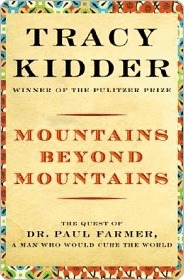More on this book
Community
Kindle Notes & Highlights
by
Tracy Kidder
Read between
August 16 - August 27, 2017
the voice of the world saying, “This meeting’s important,” and the voice of Haiti saying, “My child is dying.”
he didn’t have a plan for his life so much as he had a pattern. He was like a compass, with one leg swinging around the globe and the other planted in Haiti.
The hospital seemed less reliable without him.
It is so easy, at least for me, to mistake a person’s material resources for his interior ones.
lesson in how dangerous good intentions can be in a place as poor as Haiti.
I think free care serves an important purpose, in that it centers people. Poverty in a place like Haiti is difficult to personalize. If it’s in front of you, it has a reality.”
“Lord, a word on all this.”
It’s through journeys to the sick that we identify needs and problems.
When a sick person is discovered by accident, he usually says he’s made a lucky catch.
“You should compare suffering. Which suffering is worse. It’s called triage.”
In situations where doctors and nurses and tools are limited, on battlefields, for instance, one performs triage by attending first to the severely wounded who have the best chance of survival. The aim is to save as many as possible; the others may have to die unattended. In the peacetime case, however, in well-staffed and well-stocked American emergency rooms, for example, triage isn’t supposed to imply withholding care from anyone; rather, it’s identifying the patients in gravest danger and giving them priority. Farmer has constructed his life around this second kind of triage. What else is
...more
“You know, people from our background—like you, like most PIH-ers, like me—we’re used to being on a victory team, and actually what we’re really trying to do in PIH is to make common cause with the losers. Those are two very different things.
We want to be on the winning team, but at the risk of turning our backs on the losers, no, it’s not worth it. So you fight the long defeat.
If you say, Well, I just think how much could have been done with twenty thousand dollars, you sound thoughtful, sensible, you know, reasonable, rational, someone you really want on your side. However, if you were to point out, But a young attending physician makes one hundred thousand dollars, not twenty, and that’s five times what it cost to try to save a boy’s life—that just makes you sound like an asshole. Same world, same numbers, same figures, same currency. It’s just, you know, I never have been able to figure it out. I mean, I’ve figured it out, but I realize now it takes so much time
...more
would regard that as the basic stance of O for the P,” he replies. “I don’t care if we lose, I’m gonna try to do the right thing.”
You realize how much shit I’d get for that, Canadian crutches in rural Haiti?” “Because they’re not appropriate technology?” “Yeah. Now you can see the critiques revealed for what they are. But
I have to limit the amount of time I put into explaining all that or it just sucks your soul dry.
The woman who said to me years ago, Are you incapable of complexity? That was an epiphany for me. Are you going to punish people for thinking TB comes from sorcery? It’s like the guy on our own team, a nice guy, who said he would help with a water project in a town here, but only if the people really showed they wanted it. What if that standard had been applied to me when I was a kid, before I knew that water could carry organisms that made people sick?”
All the serious, sympathetic critiques come down to these two arguments: Hiking into the hills to see just one patient or two is a dumb way for Farmer to spend his time, and even if it weren’t, not many other people will follow his example, not enough to make much difference in the world.
he’s come to think that a willingness to do what he calls “unglamorous scut work” is the secret to successful projects in places like Cange and Carabayllo.
In public health projects in difficult locales, theory often outruns practice. Individual patients get forgotten, and what seems like a small problem gets ignored, until it grows large, like MDR. “If you focus on individual patients,” Jim Kim says, “you can’t get sloppy.”
This matters to him, I think—to feel, at least occasionally, that he doctors in obscurity, so that he knows he doctors first of all because he believes it’s the right thing to do.
If you do the right thing well, you avoid futility.
I think Farmer taps into a universal anxiety and also into a fundamental place in some troubled consciences, into what he calls “ambivalence,” the often unacknowledged uneasiness that some of the fortunate feel about their place in the world, the thing he once told me he designed his life to avoid.


